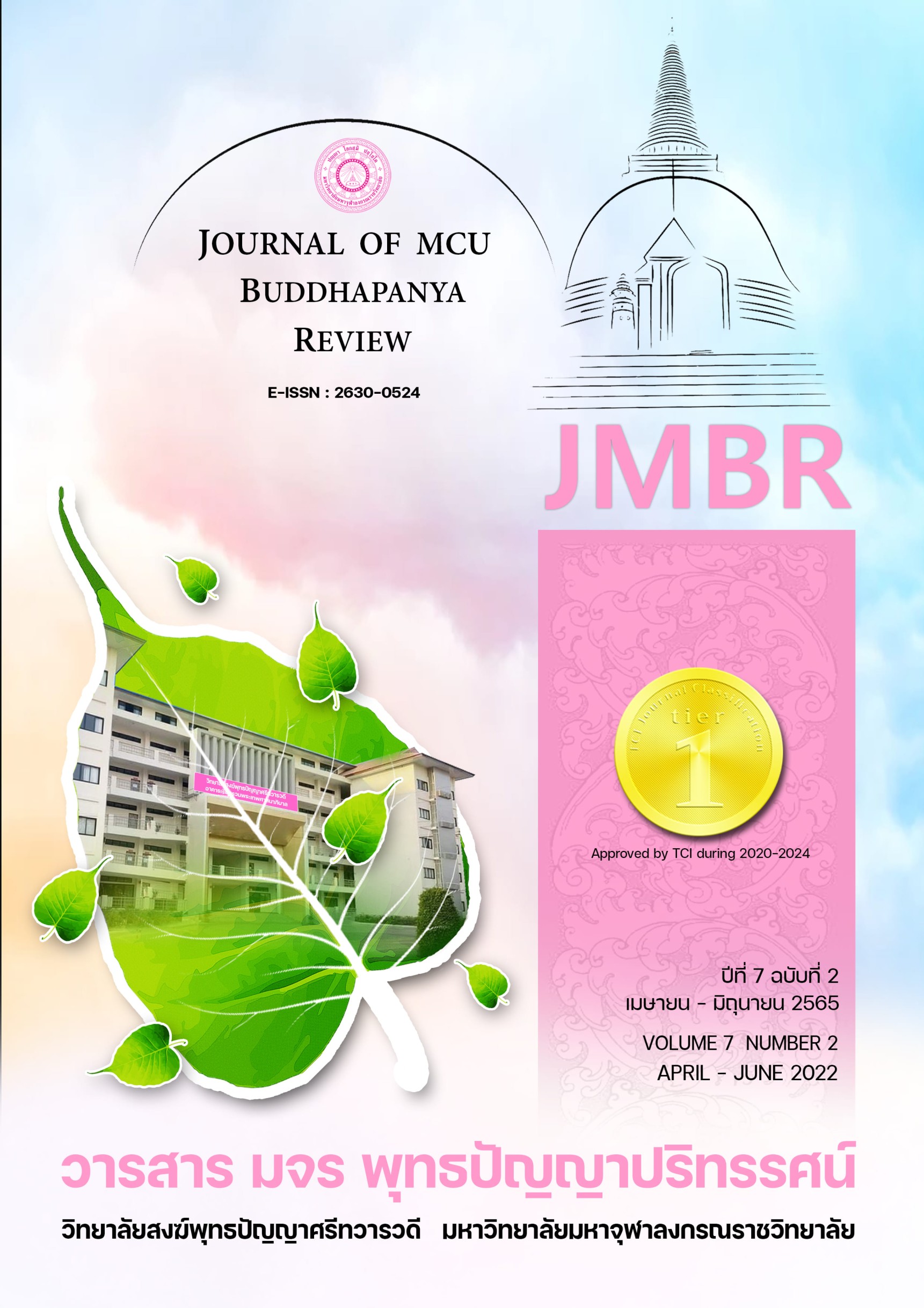ภาวะแทรกซ้อนของสำเนียงไทยในการออกเสียงสระภาษาอังกฤษ
คำสำคัญ:
Interference, Vowel, Thai Accent, English Pronunciation, Englishบทคัดย่อ
บทความวิจัยนี้มีวัตถุประสงค์เพื่อ 1) ศึกษาลักษณะของเสียงสระภาษาอังกฤษที่พูดโดยคนไทย 2) เปรียบ เทียบลักษณะทางกลสัทศาสตร์ของสระภาษาอังกฤษที่พูดโดยคนไทย และ 3) วิเคราะห์หาภาวะแทรกซ้อนของสำเนียงไทยในเสียงสระภาษาอังกฤษ งานวิจัยนี้เป็นการวิจัยเชิงคุณภาพ ศึกษาตามแนวคิดทฤษฎีการเปรียบต่าง และกลสัทศาสตร์เป็นกรอบการวิจัย กลุ่มตัวอย่างคือ ผู้บอกภาษาที่พูดภาษาไทยเป็นภาษาแม่ และพูดหรือเรียนภาษาอังกฤษเป็นที่สอง จำนวน 20 คน แบ่งตามระดับการศึกษาและเพศ ใช้วิธีคัดเลือกแบบการสุ่มตัวอย่างแบบเจาะจง เครื่องมือที่ใช้ในการวิจัยได้แก่รายการคำศัพท์ จำนวน 20 คำ วิเคราะห์ข้อมูลโดยโปรแกรม PRAAT ผลการวิจัยพบว่า
- มีลักษณะของเสียงสระในภาษาไทยในการออกเสียงสระเดี่ยวและสระประสมภาษาอังกฤษ
- การเปรียบเทียบลักษณะทางกลสัทศาสตร์โดยใช้ค่าความถี่ฟอร์เมินที่ 1 และ 2 ของเสียงสระภาษาอังกฤษที่พูดโดยคนไทยกับภาษาอังกฤษมาตรฐาน พบว่า เสียงสระส่วนใหญ่จะออกเสียงค่าความถี่ฟอร์เมินไปในทิศทางเดียวกันกับภาษาอังกฤษมาตรฐาน ยกเว้นสระบางเสียงที่แสดงถึงการใช้ลักษณะการแทรกแซงของเสียงสระในภาษาไทยมาแทนที่เสียงสระภาษาอังกฤษ
- ภาวะแทรกซ้อนของสำเนียงไทยในเสียงสระภาษาอังกฤษ พบว่ามี 4 ประการ คือ 1) การออกเสียงโดยใช้ลักษณะเกร็งเสียงในภาษาไทย 2) การขาดการลดความเป็นเสียงสระ 3) การออกเสียงสระเดี่ยวแทนเสียงสระประสม และ 4) การเลือกออกเสียงสระที่มีความคล้ายคลึงในภาษาแม่มาแทนที่
องค์ความรู้จาการวิจัยนี้สามารถนำมาประยุกต์ใช้และพัฒนาทางด้านการศึกษาในการเรียนการสอนเกี่ยวกับการออกเสียงภาษาอังกฤษสำหรับชาวไทย และเป็นความรู้พื้นฐานสำหรับนำไปประยุกต์ใช้ในการแก้ปัญหาการออกเสียงสระภาษาอังกฤษที่เกิดจากภาวะแทรกซ้อนของภาษาแม่ของคนไทยให้ดีขึ้นและมีประสิทธิภาพเหมือนกับเจ้าของภาษา
เอกสารอ้างอิง
Alqazweeni, Ali. (1990). Pronunciation difficulties as experienced by Kuwaiti students learning English as a Foreign Language. Ph.D. Dissertations, The Florida State University.
Babkina, V. (2018). Phonological Interference of Mother Tongue over the English Language Consonant Sounds Pronunciation: A Case of Peruvian Learners of English. Universidad de Piura. Facultad de Ciencias de la Educación. Piura, Perú.
Binturki, T.A. (2008). Analysis of Pronunciation Errors of Saudi ESL Learners. Master of Arts Degree. Southern Illinois University Carondale.
Charttrakul, K. (2008). A Study of Native English Usage of Small and Medium Enterprises. Journal of Multidisciplinary in Social Sciences, 4(2):1-18.
Cenoz, J. (2001). The effect of language distance, L2 status, and age on cross-linguistic influence in third language acquisiton. In J. Cenoz, B. Hufeison, & U. Jessner (Eds.), Cross-Linguistic Influence in Third Language Acquisition (pp. 8-20).
Dolati, I., and Mikaili, P. (2011). Opinion related to the main reasons on Iranian students difficulties in spoken English proficiency. Australian Journal of Basic and Applied Science. Retrieved from http://www.ajbasweb.com
Flege, J. E. (1995). Second language speech learning theory, findings, and problems, In W. Strange (Ed.), Speech Perception and Linguistic Experience: Issue in Cross-Language Research (pp.233-277). Timonium, MD: York Press.
Hewings, M. (2004). Pronunciation Practice Activities. Cambridge: Cambridge University Press.
Hunter, G & Yarkiner, Z. (2014). Formant Frequencies of British English Vowels Produced by Native Cypriot Turkish. Proceedings of the Institute of Acoustics, 36 Pt.3 2014
James, C. (1980). Contrastive Analysis. London: Longman.
James, C. (1998). Errors in Language Learning and Use-Exploring Error Analysis. New York: Addison Wesley Longman Inc.
Jitwiriyanont, S. (2019). Formant frequency normalization for studying vowel variation in Thai. Journal of Language and Culture, 38 (2): 46-65.
Jotikasthira, P. (1994). English language Phonology. Bangkok: Chulalongkorn University Press.
Lambert, W., Hodgson, R., Gardner, R., & Fillenbaum, S. (1960). Evaluational reactions to spoken languages, Journal of Abnormal Social Psychology, 60, 44-51.
Manivannan, G. (2000). Importance of the English Language. Retrieved from http://www.usingenglish.com/teachers/articles/importance-englishlanguage.html.
Mejang, A. et.al, (2011). Research to Evaluate the Performance of English Language Teaching and Learning Development Centers in Thailand. Journal of Education of Naresuan University, 13(2): 55-72.
Naksakul, K. (2001). Thai Phonology. Bangkok: Chulalongkorn University.
Nakin, P. & Inpin, B. (2017). English Consonant Pronunciation Problems of EFL Students: A Survey of EFL Students at Mae Fah Luang University. Proceedings of the Burapha University International Conference 2017, 3-4 August 2017, Chonburi, Thailand, 185 – 197.
Noobutra, C. (2019). Interaction of Markedness and Transfer of /r/ in L1 Thai Learners Acquiring L1 Thai and L2 English. Thesis of Doctor of Philosophy (Integrated). United Kingdom: Newcastle University.
Piske, T., Mackay, I.R.A., & Flege, J. E. (2001). Factors affecting degree of foreign accent in an L2: A review. Journal of Phonetics, 29, 191-215.
Plailek, T. (2011). Factors Effecting English Speaking Ability of Second Year English Major Students in the Faculty of Education, Rajabhat Universities in Bangkok Metropolitan Area. Research and Development Journal, 3(2011): 52-58.
Prahartiwi, W. (2017). The Interference of Thai Students’ First Language on Their Production of English consonants. Thesis of Bachelor Degree in English Language Education. Indonesia: University of Muhammadiyah Malang.
Roach, P. (1983, 1991) English phonetics and phonology: A practical course. Cambridge: Cambridge University Press.
Sa-e-dee, S. (2020). English Pronunciation Problems of Thai Students in Semarang. Thesis of Bachelor of Education. Indonesia: Walisongo State Islamic University.
Soontornwipat, S. & Boonchuay, S. (2016). The Pronunciation of Two English Final Consonant Clusters by Huachiew Chalermprakiet University students. Liberal Arts Review, 11(22): 1-7.
Suntornsawet, J. (2019). Problematic Phonological Features of Foreign Accented English Pronunciation as Threats to International Intelligibility: Thai EIL Pronunciation Core. Journal of English as an International Language, 14(2): 72-93.
Tanthanis, T. (2012). A Study of English Pronunciation Problems and English Pronunciation Leaning Strategies of Third Year Interdisciplinary Studies Students of Thammasat University. Language and Linguistics. 31(1): 81-102.
Tumtavitikul, A. (1997). Phonetics in the Study of Poetry Literature. Seminar Documents on the Approach to Literary Criticism, 21-50. Bangkok: Kasetsart University.
Wannapok, S. (2004). A Study English for Business and Technology Students’ Attitudes towards the English for Business and Technology Program at the University of the Thai Chamber of Commerce. Independent Study, Bangkok: University of the Thai Chamber of Commerce.
ดาวน์โหลด
เผยแพร่แล้ว
รูปแบบการอ้างอิง
ฉบับ
ประเภทบทความ
สัญญาอนุญาต
ลิขสิทธิ์ (c) 2022 วารสาร มจร พุทธปัญญาปริทรรศน์

อนุญาตภายใต้เงื่อนไข Creative Commons Attribution-NonCommercial-NoDerivatives 4.0 International License.



